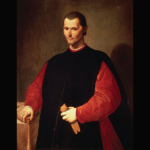Quote:
Cesare Borgia was considered cruel; notwithstanding, his cruelty reconciled the Romagna, unified it, and restored it to peace and loyalty (…) Upon this a question arises: whether it be better to be loved than feared or feared than loved? It may be answered that one should wish to be both, but, because it is difficult to unite them in one person, is much safer to be feared than loved, when, of the two, either must be dispensed with.
Source:
Niccolò Machiavelli (2016, Original 1513): The Prince, Chapter XVII. Ontario: Devolted Publishing, p. 40
Author Bio:
Niccolò Machiavelli (1469-1527) was a philosopher and politician from Florence. In this piece of writing, he advocated for authoritarian power politics.
Context:
 Machiavelli had a strong influence on state philosophy and still represents an authoritarian and ruthless idea of rule. This was based on his image of man: “Because this is to be asserted in general of men, that they are ungrateful, fickle, false, cowardly, covetous, and as long as you succeed they are yours entirely; they will offer you their blood, property, life and children, as is said above, when the need is far distant; but when it approaches they turn against you.” (ibid.) Even during his lifetime, Machiavelli was strongly criticised for his authoritarian ideas on state leadership, for example by the English cardinal Reginald Pole (1500-1558). Nevertheless, centuries later, this power politics was still a model for colonisers and warring parties; an example are the retaliatory measures taken by the National Socialists against resistance fighters during World War II.
Machiavelli had a strong influence on state philosophy and still represents an authoritarian and ruthless idea of rule. This was based on his image of man: “Because this is to be asserted in general of men, that they are ungrateful, fickle, false, cowardly, covetous, and as long as you succeed they are yours entirely; they will offer you their blood, property, life and children, as is said above, when the need is far distant; but when it approaches they turn against you.” (ibid.) Even during his lifetime, Machiavelli was strongly criticised for his authoritarian ideas on state leadership, for example by the English cardinal Reginald Pole (1500-1558). Nevertheless, centuries later, this power politics was still a model for colonisers and warring parties; an example are the retaliatory measures taken by the National Socialists against resistance fighters during World War II.Further Reading:
The Guardian (Erica Brenner), 03.03.2017: Have we got Machiavelli all wrong?
Year:
1513